Who Scored Football's First Touchdown?
I'm nearing 1,000 articles on this site (not including podcast links), yet none address who scored football's first touchdown. I'm in good company. I googled "Who scored football's first touchdown?" and it appears that no one else has asked or answered that question, at least in the few sites, articles, and books that Google searches. Reddit has information about Eddie Novak of the Rock Island Independents scoring the first touchdown in the APFC, the year before the Johnny-come-lately league renamed itself the NFL. Still, that score came two generations after football's first touchdown.
So, who scored football's first touchdown?
The answer depends on how you define football, leaving several possibilities. Although many poor souls believe the first college football games were the 1869 Princeton-Rutgers contests, that is balderdash. Those games were soccer-like matches with 25 players per side, none of whom could carry the game's round ball. Similar games occurred over the next few years, and even if you want to believe the tall tale that those soccer matches were the first college football games, none of them included touchdowns, so they don't count for this story.
So, who scored football's first touchdown?
American football derives from a series of matches between Harvard and McGill and some All-Canada teams in 1874, 1875, and 1876. The teams played a game or two under Harvard's preferred Boston game rules, which did not allow runners to score touchdowns. Most games in the series used rugby-ish rules. Canadians were subjects of the Crown then, with British soldiers stationed on their soil. Between those soldiers and their allegiance to the Isles, the sporting set in Canada kicked and carried the ball according to Britain's Rugby Union rules.
The Football Association of Canada's Rugby Union rules of 1873 are identical to the English Rugby Union rules of the same year. However, the students at McGill veered from the formal rugby rules, modifying them so they had one-third as many rules. Most important for this discussion, McGill's 1874 rules made a terminology change. Rugby Union referred to a player touching the ball down behind the opponent's goal line as a "try," while McGill changed the name to "touch-down."
Rule ix. A match shall last for three half hours -- it shall be decided by the majority of goals, or in the event of no goals being obtained by the majority of touch-downs, three touchdowns counting as one goal.
Under Rugby Union rules at the time, the only way to score was to kick a goal, either from the field (i.e., field goals) or a goal following a try. Tries did not score points but allowed teams to attempt an unopposed goal kick. McGill's rules also valued touchdowns to determine the match winner if neither team scored a goal.
The first game played under McGill's new rules came on October 23, 1874, a match with Harvard in which the Crimson scored three touchdowns, so they won 1-0. The Montreal Gazette and the Boston Advertiser published separate stories about the game. Both stories indicate that Gorham P. Faucon scored one Harvard touchdown and James P. Wetherbee two, but the Gazette tells us Faucon scored first, while the Advertiser says Wetherbee scored the first two tuddies.
So, who scored football's first touchdown?
I only showed part of the Boston Advertiser article, but it’s more detailed than the Montreal Gazette version. J. B. Millett, Harvard Class of 1877, wrote the Advertiser story. Since he was a Harvard student, I trust the Boston article's accuracy when naming names—at least until someone else digs up information to the contrary.
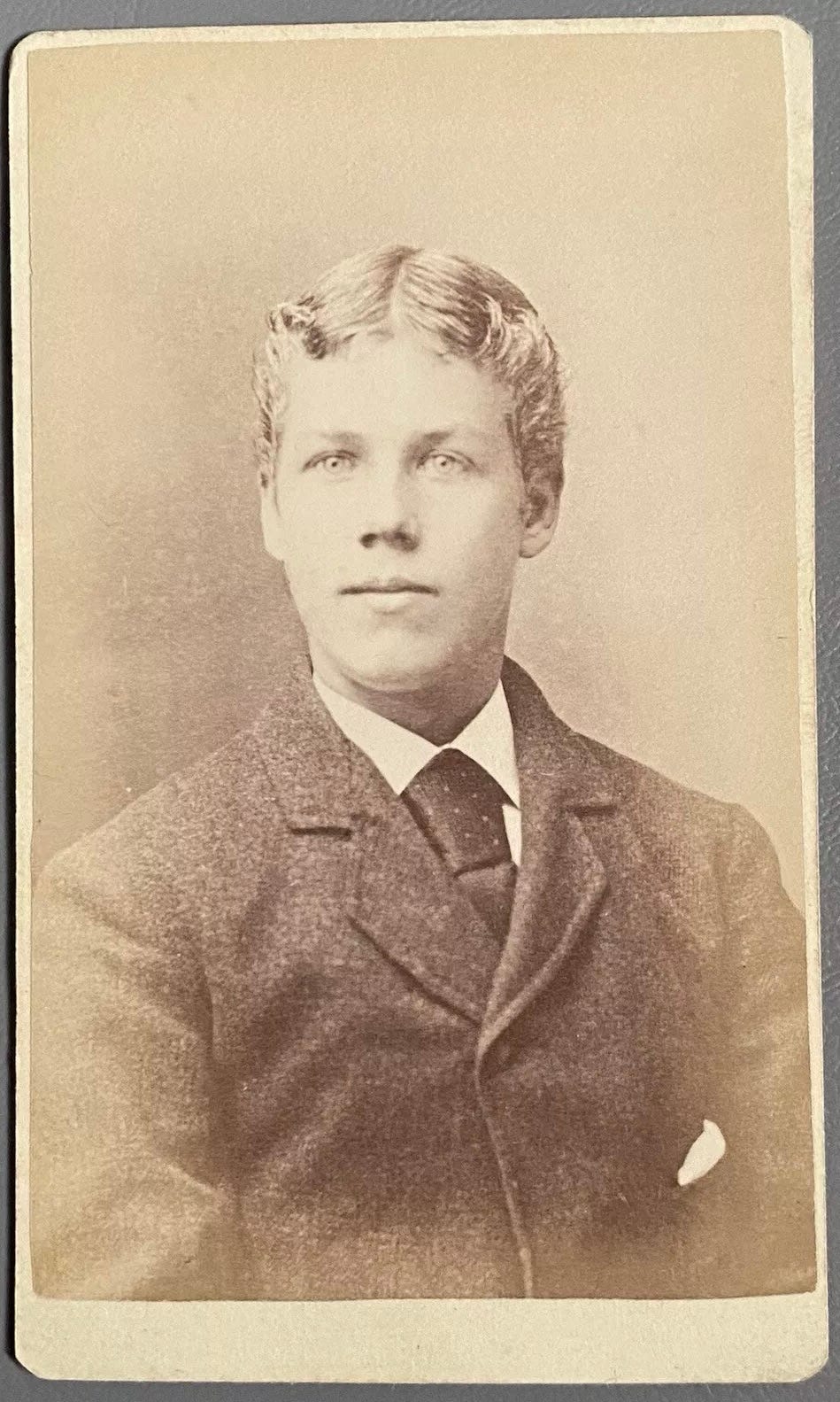
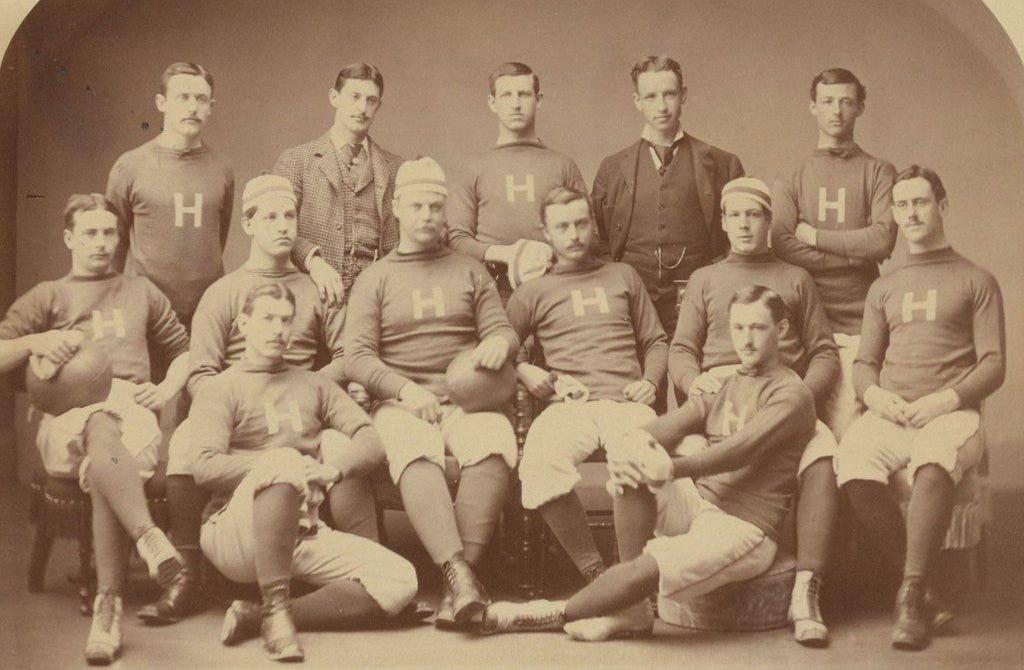
Best as I can tell, the first touchdown scored in a game between two American colleges came on October 27, 1875, when Harvard and Tufts played a rugby match. Harvard may have borrowed McGill’s rules, but at minimum, they borrowed McGill’s vocabulary since the game included “touchdowns.” Neither team scored for most of the three 30-minute innings, but Herrick of Harvard kicked the ball through the uprights late in the game. The Tufts’ tends (akin to goaltenders), thinking Harvard scored a goal, did not retrieve the ball, allowing Harvard's Gorham Faucon to cross the goal line and pick up the ball. As it turned out, the referee ruled that Herrick had punted the ball, not drop-kicked it, so the apparent goal did not count. That meant the ball was live when Faucon grabbed it behind the goal line, and picking it off the ground constituted a touchdown. In turn, that gave Harvard the chance for a free kick, which they converted to win the game.
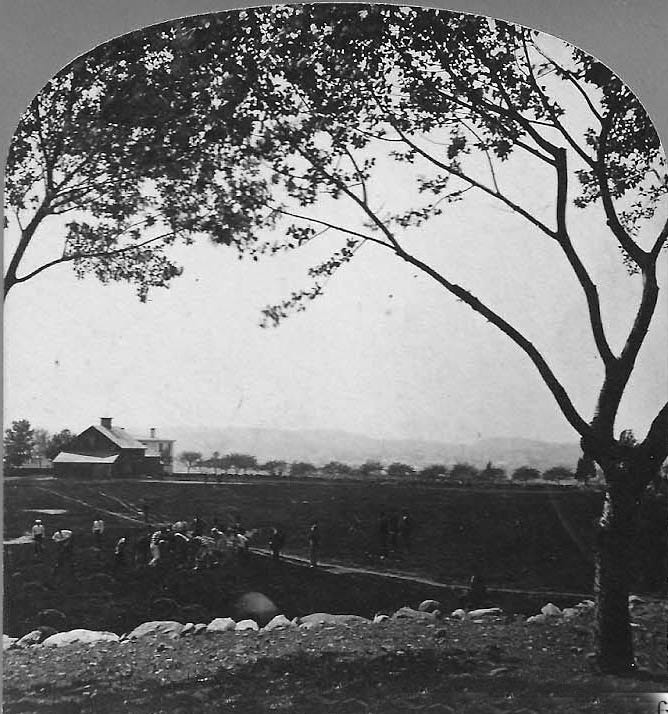
So, who scored football's first touchdown?
While the games described previously included touchdowns, one can argue they were rugby matches, not football games. Harvard was the first American school to convert to rugby, while other American colleges played soccer-like games under the College Association or local rules until 1876. Often, teams negotiated the playing rules on a game-by-game basis, so they never knew which rules they would use or how many would play per side, making practice and roster management difficult.
To solve that problem, Princeton called a meeting among select schools to agree on a standard set of rules. The November 23, 1876, meeting formed the Intercollegiate Football Association (IFA), which rejected soccer and McGill's modified rules in favor of the Rugby Union rules, with four minor rule changes. As the New York Daily Herald commented at the time:
The Rugby rules are the result of years of experience, and it would be very foolish, to say the least, for those who know but little of the game to attempt to improve or alter them.
‘Football,' New York Daily Herald, November 18, 1876.
Among the IFA's rule changes was the terminology switch from rugby's "try" to football's "touchdown," so teams playing by IFA rules could score touchdowns moving forward. The rules adopted in 1876 evolved over the years, such that the game stopped being rugby and became football somewhere along the line. When that occurred is anyone's guess, but an unbroken line of rules exists from the IFA's 1876 meeting to today's NCAA, NFL, and NFHS rules, which tells me that football was born on November 23, 1876. In turn, the first game played under the IFA rules provided the opportunity for football's first touchdown.
So, who scored football's first touchdown?
The first contest played under IFA rules was the Yale-Princeton game of November 30, 1876, at St. George's Cricket Club in Hoboken. Early in the game, Yale's C. C. Camp (Walter's cousin) snagged and advanced the ball before being tackled. He then tossed the ball to his teammate, O. D. Thompson, who ran it in for a touchdown. Princeton protested that Thompson was off-side at the time, which would have made it an illegal forward pass, but the referee ruled otherwise, and the touchdown stood as called. Yale converted the kick and later scored another to win 2-0.
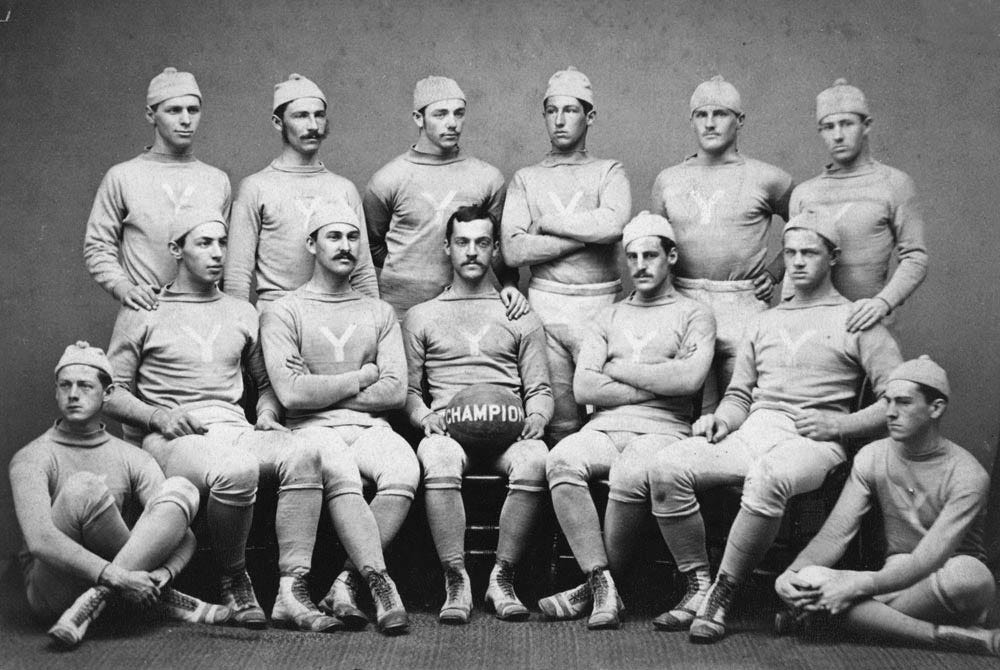
It is worth noting that 16 years later, O. D. Thompson was the Allegheny Athletic Association team manager who paid former Yalie Pudge Heffelfinger $500 to play in a football game, making Pudge the first professional football player.
So, who scored the first touchdown? James P. Wetherbee, maybe Gorham P. Faucon.
Who scored the first touchdown in a game involving two American colleges? Gorham P. Faucon
Who scored the first touchdown in a “football” game? Oliver "O. D." Thompson
Hopefully, that clears things up while alerting everyone that they have nine weeks to prepare for the 150th anniversary of the first touchdown. Get ready if you celebrate such occasions.
Click here for options on how to support this site beyond a free subscription.


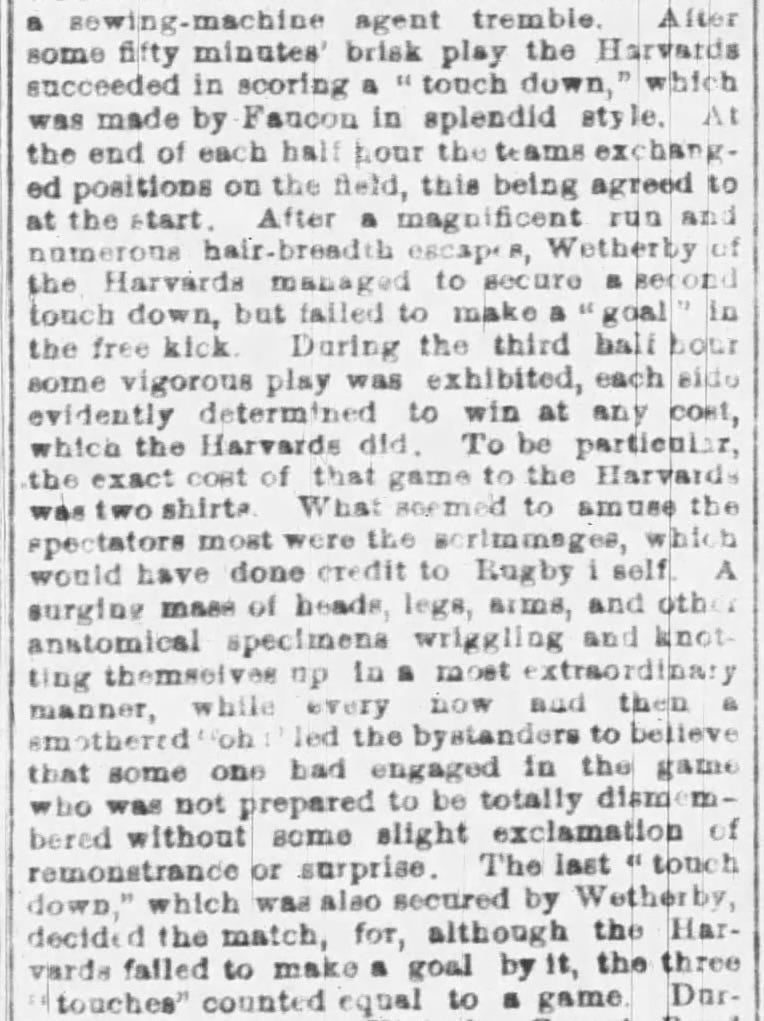
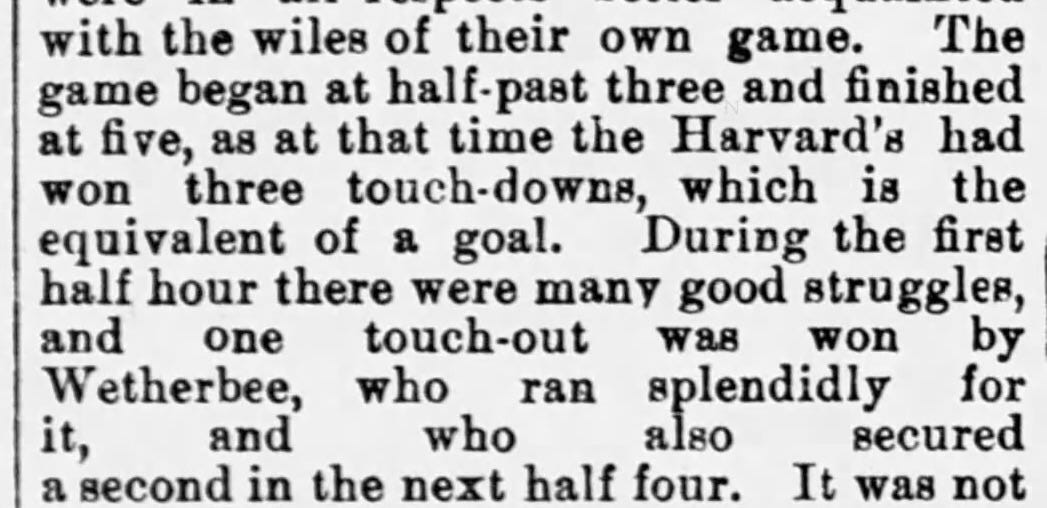
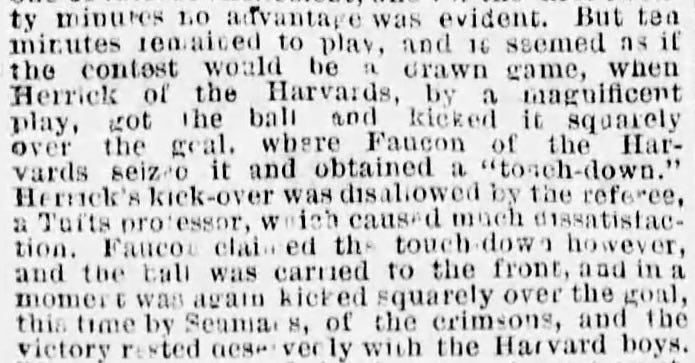
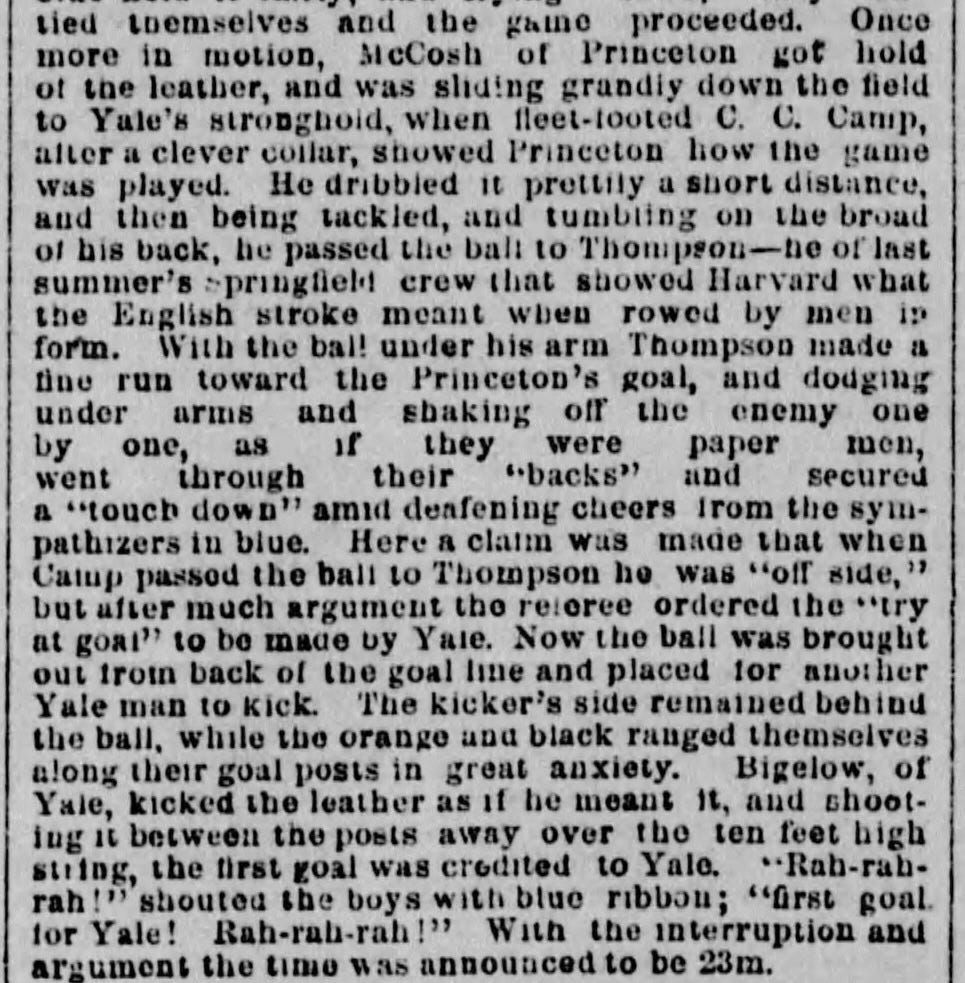
Excellent research and presentation of the facts! I think Mr. Faucon having two mentions of the three , even though it was Rugby football has the advantage in quantity for the title.